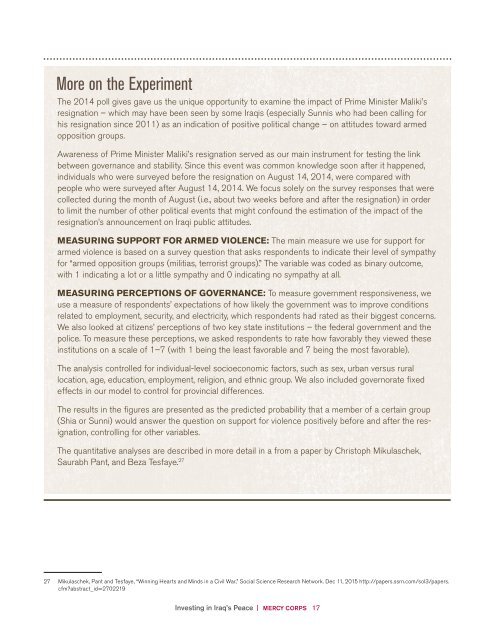INVESTING IN IRAQ’S PEACE
Investing%20in%20Iraqs%20Peace_Final%20Report
Investing%20in%20Iraqs%20Peace_Final%20Report
Create successful ePaper yourself
Turn your PDF publications into a flip-book with our unique Google optimized e-Paper software.
More on the Experiment<br />
The 2014 poll gives gave us the unique opportunity to examine the impact of Prime Minister Maliki’s<br />
resignation – which may have been seen by some Iraqis (especially Sunnis who had been calling for<br />
his resignation since 2011) as an indication of positive political change – on attitudes toward armed<br />
opposition groups.<br />
Awareness of Prime Minister Maliki’s resignation served as our main instrument for testing the link<br />
between governance and stability. Since this event was common knowledge soon after it happened,<br />
individuals who were surveyed before the resignation on August 14, 2014, were compared with<br />
people who were surveyed after August 14, 2014. We focus solely on the survey responses that were<br />
collected during the month of August (i.e., about two weeks before and after the resignation) in order<br />
to limit the number of other political events that might confound the estimation of the impact of the<br />
resignation’s announcement on Iraqi public attitudes.<br />
MEASUR<strong>IN</strong>G SUPPORT FOR ARMED VIOLENCE: The main measure we use for support for<br />
armed violence is based on a survey question that asks respondents to indicate their level of sympathy<br />
for “armed opposition groups (militias, terrorist groups).” The variable was coded as binary outcome,<br />
with 1 indicating a lot or a little sympathy and 0 indicating no sympathy at all.<br />
MEASUR<strong>IN</strong>G PERCEPTIONS OF GOVERNANCE: To measure government responsiveness, we<br />
use a measure of respondents’ expectations of how likely the government was to improve conditions<br />
related to employment, security, and electricity, which respondents had rated as their biggest concerns.<br />
We also looked at citizens’ perceptions of two key state institutions – the federal government and the<br />
police. To measure these perceptions, we asked respondents to rate how favorably they viewed these<br />
institutions on a scale of 1–7 (with 1 being the least favorable and 7 being the most favorable).<br />
The analysis controlled for individual-level socioeconomic factors, such as sex, urban versus rural<br />
location, age, education, employment, religion, and ethnic group. We also included governorate fixed<br />
effects in our model to control for provincial differences.<br />
The results in the figures are presented as the predicted probability that a member of a certain group<br />
(Shia or Sunni) would answer the question on support for violence positively before and after the resignation,<br />
controlling for other variables.<br />
The quantitative analyses are described in more detail in a from a paper by Christoph Mikulaschek,<br />
Saurabh Pant, and Beza Tesfaye. 27<br />
27<br />
27 Mikulaschek, Pant and Tesfaye, “Winning Hearts and Minds in a Civil War,” Social Science Research Network. Dec 11, 2015 http://papers.ssrn.com/sol3/papers.<br />
cfm?abstract_id=2702219<br />
Investing in Iraq’s Peace | MERCY CORPS 17


